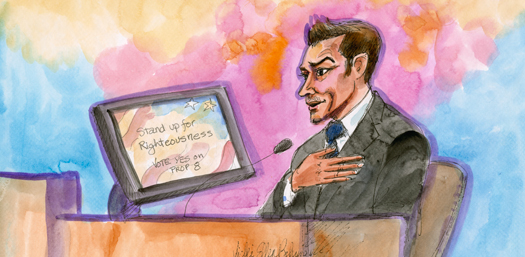Marriage News Blog
On the first day of trial, AFER plaintiff Paul Katami testified about why he wanted to marry his partner of nearly 10 years, Jeff Zarrillo.┬Ā Katami also explained the difficulties he faces in everyday as an out gay man, and how the messaging of the Proposition 8 campaign was particularly hurtful.
Watch Matthew Morrison reenact Paul KatamiŌĆÖs testimony during the Los Angeles premiere of ŌĆ£8ŌĆØ the play.
Testimony Highlights
ŌĆ£Being married allows us access to the language. Being able to call him my husband is so definitive, it changes our relationship.ŌĆØ
ŌĆ£I can safely say that if I were married to Jeff, that I know that the struggle that we have validating ourselves to other people would be diminished and potentially eradicated.ŌĆØ
ŌĆ£[Coming out] was a gradual process. I struggled with it quite a bit. Being surrounded by what seemed everything heterosexual, you know, you tend to try and want to fit into that. Because when you are considered different from the norm, you’re subject to all kinds of issues and situations that you want to avoid; you shouldn’t have to deal with in life.ŌĆØ
ŌĆ£[P]rotect the children is a big part of the [Proposition 8] campaign. And when I think of protecting your children, you protect them from people who will perpetrate crimes against them, people who might get them hooked on a drug, a pedophile, or some person that you need protecting from.
ŌĆ£You don’t protect yourself from an amicable person or a good person. You protect yourself from things that can harm you physically, emotionally. And so insulting, even the insinuation that I would be part of that category. So far away from that category.ŌĆØ
“The Proposition 8 campaign advertisements ŌĆ£just demeans you. It just makes you feel like people are putting efforts into discriminating against you.ŌĆØ
“The big deal [about domestic partnerships] is, it’s creating a separate category for us. And that’s a major deal because it makes you into a second, third, and ŌĆ” ┬Āfourth class citizen now that we actually recognize marriages from other states.
ŌĆ£And everyone says, ŌĆśOh, but that’s a huge stride; you. Get rights.ŌĆÖ But we still have discrimination.
ŌĆ£So it’s likeŌĆöfor lack of a better image, it’s putting a Twinkie at the end of a treadmill and then saying, ŌĆśHere’s a bite. Here’s another bite.ŌĆÖ Well, you want that Twinkie. You want the whole thing. I know it’s a rudimentary example of what it is, but that’s how it is. It is not the same.
ŌĆ£ŌĆśOh, but you have the same rights.ŌĆÖ Yeah, but what am I supposed to do, go have a domestic partner ceremony and then a reception? It’s not what you do. None of our friends have ever said, ŌĆśHey, this is my domestic partner.ŌĆÖŌĆØ

